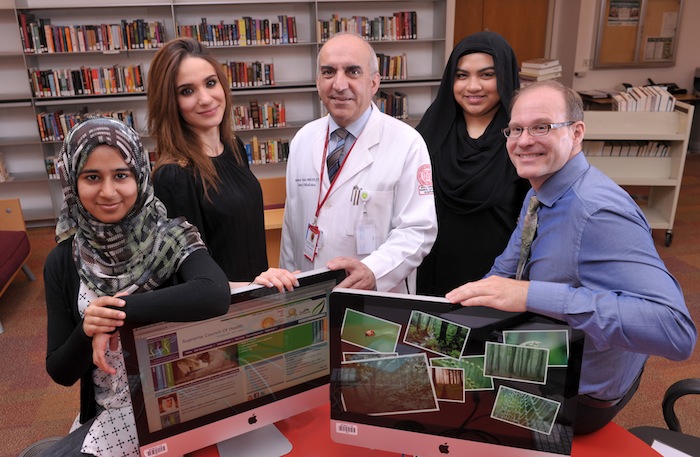Qatar scores a first with new study of GCC Internet health
February, 2015

Zahra Rahman, Nadeen Al-Baz, Dr. Mohamud A. Verjee, Fathima Ameerudeen and Dr. Alan S. Weber
Researchers at WCMC-Q have published the first comprehensive analysis of Internet health information in the Gulf Cooperation Council (GCC) region.
The study entitled “Typology and Credibility of Gulf Cooperation Council (GCC) Internet Health Websites” appeared in the World Health Organization (WHO) publication Eastern Mediterranean Health Journal. This research additionally won a national award for the top student research grant, awarded by Qatar National Research Fund (QNRF) in its Undergraduate Research Experience Program.
The research, carried out from 2012-14, retrieved all of the 925 functional health websites in the Gulf Cooperation Council region, which comprises Bahrain, Oman, Kuwait, Qatar, Saudi Arabia, and the United Arab Emirates, and categorized the information found on them.
Dr. Alan S. Weber, associate professor of English in the Pre-medical Department, and Dr. Mohamud A. Verjee, associate professor of family medicine, jointly led the faculty research. The student research team consisted of Zahra Rahman, Fathima Ameerudeen and Nadeen Al-Baz, all third-year medical students at WCMC-Q.
The authors developed a novel checklist based on website quality criteria from international organizations such as the Health on the Net Foundation (HON). The checklist determined if the sites contained such key information as privacy policies, advertising policies, current date, attribution of information to qualified medical professionals, and other important information necessary to help a health consumer determine the accuracy and validity of the information on the site.
Qatar scored highly on its e-health readiness as well as site quality. In 8 out of 10 quality categories measured by the authors, Qatari websites scored higher than the GCC average.
However, Dr. Weber and Dr. Verjee cautioned that serious deficiencies in health websites in both Qatar and the GCC should be addressed, specifically:
• Technical medical information needs to be dated, and the authorship and credentials disclosed.
• Websites should be available in languages other than Arabic and English, due to the large Asian
expatriate populations of the Gulf.
• Sponsorships, site ownerships, and advertising policies should be disclosed clearly.
• Privacy and security policies need to be implemented and disclosed.
The team stressed that Qatar is now uniquely placed to take a leading role in Internet-based health information in the region. Factors such as Qatar’s high Internet connectivity and penetration rates, planned broadband infrastructural upgrades, a positive youth attitude towards technology, and health sector improvements are all valuable assets for future development of e-health in Qatar.
The WCMC-Q research team also wrote and published a set of Arabic and English public health information brochures to help Qataris evaluate Internet health information and use web health resources safely. The brochures have been distributed throughout the public health system in Doha.
Dr. Weber said: “As Internet infrastructure matures in the region and GCC citizens gain greater health literacy, e-health will be able to provide accurate and up to date consumer health information for patients to supplement advice from their doctors, as well as technical information for medical professionals. Although this study identified specific weaknesses in consumer health on the Internet in the GCC, governments and web site owners could address these concerns simply through new regulations and better site development.”
Dr. Verjee added: “Health has become a priority area in GCC government planning since new gas and oil revenues are underwriting higher quality universal care and new resources. Although patients are increasingly seeking health information on the Internet, the physician should be the primary source of information on medical matters. Both physicians and websites should provide the best possible information to the patient without any commercial bias or potential conflicts of interest.”
